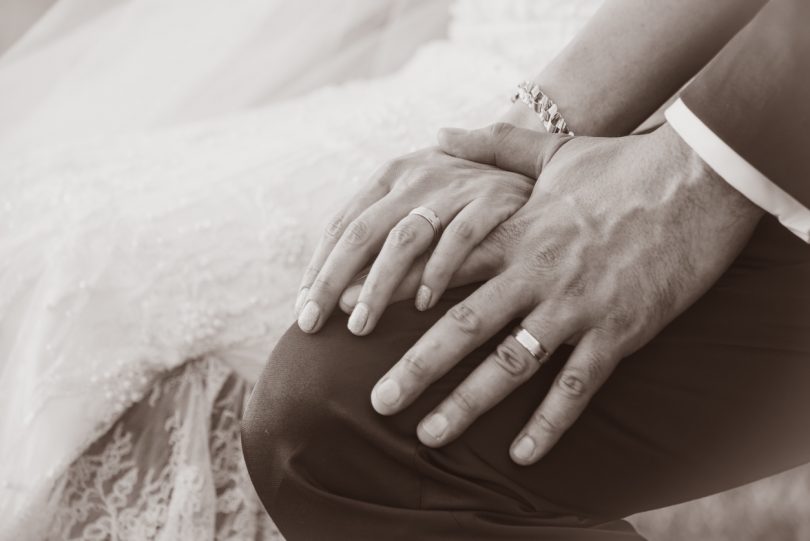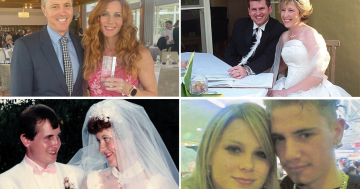
Michael and Angel define love in all its forms.
With the same-sex marriage survey results imminent, Kim Huynh asks some notable Canberrans for their insights and experiences on marriage. This week he speaks to Angel and Michael, a polyamorous couple whose love, trust and understanding for one another has been strengthened by partnering with others.
Kim: How did you meet?
Michael: We were high school sweethearts. I was her safety date to the formal.
Angel: He was the person I went with because I didn’t have anyone else to go with. He was the backup.
Kim: When did you decide that the polyamorous path was right for you?
Angel: It was three or four years in. We knew that it was going to be a long-term relationship, but we were each other’s first serious partners, and we both wanted to have relationships and experiences with other people. At the same time, we didn’t want to break up, because we were still madly in love with one another. First, we decided to have a physically open relationship. We were like that for about four years, and then we decided that we both had the capacity to feel romantically for other people without it negatively affecting our relationship. So, we became poly.
Michael: That was after we moved to Canberra where we encountered more open-minded people than you would find in the buckle of Queensland’s bible belt.
Kim: Why did you get married?
Angel: Legal protection is the main reason. So that I was recognised as Michael’s next of kin, and to make it easier for things like home ownership.
Michael: Also, it was an opportunity to catch up with family and have a good party and holiday!
Kim: I spoke to a marriage celebrant who told me that one of the essential parts of a legal ceremony is the monitum where the celebrant declares that, ‘According to the law in Australia, marriage is the union of a man and a woman to the exclusion of all others’. Was that requirement of exclusivity difficult for you to sign up to?
Michael: We had to discuss and decide how that would work for us. What Angel and I share is exclusively ours. I don’t share what I have with Angel with my girlfriends, and she doesn’t share what she has with me with her boyfriends.
Kim: Polyamorous relationships are commonly marked by ‘compersion’. What’s compersion?
Angel: Compersion is the sense of joy that you get when you see someone you love getting joy from someone else’s company. I absolutely feel it when I see Michael and his girlfriend together. They’re the most adorable couple. It makes me happy to see them together and happy.
Michael: If you see your child playing with a puppy and squealing with joy, then you feel joy yourself. That’s essentially what compersion is. I appreciate the intimacy that Angel has with her boyfriend, and I like that. I like seeing people I care about enjoying themselves and feeling pleasure. It’s like the opposite of jealousy or envy.
Angel: There’s this perception that when it comes to romantic relationships, we only have so much love to give. That doesn’t apply to other types of relationships, which I think is limiting. The fact that I love my boyfriend doesn’t in any way lessen my love for my husband. I just get and give double the love, which is beautiful.
Michael: Not only that, it takes the pressure off. There’s this idea in our society that your spouse has to be your lover, your supporter, your friend, your everything, but if Angel and I are having a really bad day or week, one of us doesn’t have to suck it up and look after the other one. Instead, I can say to my girlfriend, ‘Hey, Angel is not feeling so good, I need some support’, and I can get true emotional support – even if it’s just a chat over the phone – without having to overburden my wife.
Angel: Communication is key. It’s especially important for poly couples and it’s something that’s improved in our relationship since we became polyamorous. It forced us to be honest and open about some dark and difficult things, especially early on when there was jealousy. We had to talk about how we felt and why, which brought us closer and improved our understanding of one another. It’s also enhanced the trust in our relationship. I completely trust Michael. I’m not concerned that he’ll ever cheat on me because he’ll just tell me that he wants to see someone else and that’s fine.
Michael: Time management is important. Shared calendars are very useful to tell others when you are available and when you’re not. I must keep an eye on what’s going on in not only Angel and my girlfriend’s lives, but also in Angel’s boyfriend’s life.
Kim: You talk about ‘coming out’ as polyamorous because it’s part of your identity. How do people react when you come out?
Angel: Usually people are supportive. Most people just need to understand what it’s about. I tend to get a lot of questions from people, but in a positive way. They’re just curious.
Michael: I came out to my family at a Christmas dinner. My father said, ‘I’ve got a lot of questions about that.’ My mother said, ‘Who wants dessert?’ But the next year, my mother invited me and my then-girlfriend, and Angel and her then-boyfriend up for Christmas. We made a family trip of it.
Kim: Bigamy, having more than one spouse, is an offence. If it wasn’t, would you be open to the prospect of taking on additional spouses?
Michael: There’s a lot of legal complications involved with having multiple marriages. Monogamy comes with protections and assurances. If I was in a car accident and was in a coma, Angel would decide about my medical care. Those decisions would be more difficult and complicated if I had two wives.
Angel: That’s also where I stand. I’ve had a partner in the past who was for all intents and purposes a life partner, but there would have to be a lot of legislative reform before I would consider marrying another person.
Kim: So your resistance to polygamy is more logistical than moral?
Angel and Michael: Absolutely. Yes.
Kim: How would your relationship be different if you had chosen monogamy? Do you think you would still be together?
Michael: I don’t know about that. Our communication and time management skills have improved a lot, largely from being in a polyamorous relationship. Over the years, thanks to the experiences that we have with other partners, our relationship has grown stronger. We fight and disagree less. We are happier, we put less stress on one another. It works for us.
Angel: I would love to think that Michael and I would still be together, because I love him dearly and can’t imagine life without him. At the same time, I acknowledge that because we got together quite young and were inexperienced, I wonder if I would have resented that. I’m a strong and independent person who likes to have new experiences, so monogamy might have created tension between us and stopped me from exploring who I am.
Kim Huynh is a RiotACT columnist, ANU lecturer, and radio presenter. This interview was originally aired on ABC Radio Canberra Drive.





















